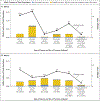Tumour lineage shapes BRCA-mediated phenotypes.
Jonsson P, Bandlamudi C, Cheng ML, Srinivasan P, Chavan SS, Friedman ND, Rosen EY, Richards AL, Bouvier N, Selcuklu SD, Bielski CM, Abida W, Mandelker D, Birsoy O, Zhang L, Zehir A, Donoghue MTA, Baselga J, Offit K, Scher HI, O'Reilly EM, Stadler ZK, Schultz N, Socci ND, Viale A, Ladanyi M, Robson ME, Hyman DM, Berger MF, Solit DB, Taylor BS.
Jonsson P, et al.
Nature. 2019 Jul;571(7766):576-579. doi: 10.1038/s41586-019-1382-1. Epub 2019 Jul 10.
Nature. 2019.
PMID: 31292550
Free PMC article.

